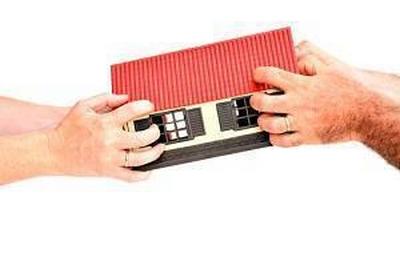Divorce and a Shared Mortgage: What are Your Options?
 Millions of married couples purchase homes together. With two combined incomes, couples are able to afford nicer and larger properties, and many intend on settling down and starting a family together. Although the real estate market is down from its peak a few years ago, purchasing a home is still extremely expensive, and most couples take out a joint mortgage. While the intention may be to pay off the home together over time, that is not always the outcome. If you and your spouse are facing a divorce, what happens with your shared mortgage? There are a few different options from which to choose, depending on your individual situation.
Millions of married couples purchase homes together. With two combined incomes, couples are able to afford nicer and larger properties, and many intend on settling down and starting a family together. Although the real estate market is down from its peak a few years ago, purchasing a home is still extremely expensive, and most couples take out a joint mortgage. While the intention may be to pay off the home together over time, that is not always the outcome. If you and your spouse are facing a divorce, what happens with your shared mortgage? There are a few different options from which to choose, depending on your individual situation.
Illinois is an equitable division state, meaning that any marital property is to be divided fairly between both parties. This includes, but is not limited to, cars, furniture, bank accounts, and your shared home. In most cases, the home will be in both spouses' names, as it is often necessary to combine incomes to qualify for a mortgage. This means that both spouses are entitled to a portion of the equity value, and are both responsible for any shared mortgage debt. This is risky. No matter what your divorce agreement says, if both names remain on a mortgage, both spouses, even when separated, are responsible for paying off the debt. Lenders do not abide by divorce agreements, and, therefore, are able to go after any party still listed on the mortgage note. Couples have a few different options on how to handle their shared mortgage, depending on their financial and personal situations.
Sell the Property
Selling your shared home is, by far, the simplest way to handle your joint mortgage. When a divorcing couples sells their home, the funds will first go to paying off any remaining mortgage debt, and any leftovers will be divided between the two spouses. Both couples can then move on with clean financial slates. Selling, however, is not always an option for couples. Often, property values dip, sometimes even below the amount of the outstanding mortgage debt a couple shares. It would certainly not be advantageous to sell the property if the profits would not even cover the mortgage debt. Selling may also be a difficult choice for couples with children. Many parents fear the impact moving will have on their children, who are already dealing with a tough divorce transition. Changing school districts, friends, and neighborhoods may be too traumatic, and many couples with kids explore other options.
Refinance
If you and your spouse can agree on who should keep the home, refinancing can be an excellent option. The spouse who intends on keeping the home refinances the mortgage, becoming the sole name on the agreement and removing all liability for the other spouse. The spouse who keeps the home will also be required to compensate the other for the value of their equitable share.
Refinancing does have its challenges though. Remember that many couples only qualify for their mortgage when both spouses' incomes are combined. When refinancing, the spouse who keeps the house may not be able to afford the mortgage on their own. If they have a low credit score or other debts, they may simply not qualify for a refinanced mortgage. Homeowners need to keep in mind that owning property is expensive, and there are going to be other costs in addition to the mortgage. Before refinancing, discuss with your spouse all of the potential costs involved, and be sure that whoever acquires the home can afford all of it. If the spouse intending on staying with the home is financially qualified, refinancing is a great way to remove liability for the other spouse.
Other Options
While selling or refinancing are two of the most commonly-used options, homeowners have other choices. One spouse could potentially buy out the other’s share of the home, if they can both agree to the terms. While this option legally changes the deed of the home to list only one homeowner, it does not change the terms of a shared mortgage, so both parties could be held responsible for the debt. It is possible, however, to speak with your mortgage lender and see if one party can be released from the mortgage after the buy out. Keep in mind that there may be fees associated with making changes to your mortgage.
Many couples also decide to do nothing with their mortgage. Both spouses agree on who should keep the property, but they do nothing with their shared mortgage. This is a reasonable option, assuming the spouse who keeps the property continues paying off the debt. If they default, however, both spouses will be held accountable.
Handling a shared mortgage is just one small part in the much larger divorce process. Having a qualified Naperville divorce attorney on your team is the best way to ensure your rights and needs are met. An attorney can review your property division options with you, and help you decide on the best option for your individual case. Contact the Pesce Law Group, P.C. at 630-352-2240 today.
Source:
http://www.nytimes.com/2015/11/01/realestate/divorce-and-the-shared-mortgage.html











 630-352-2240
630-352-2240



